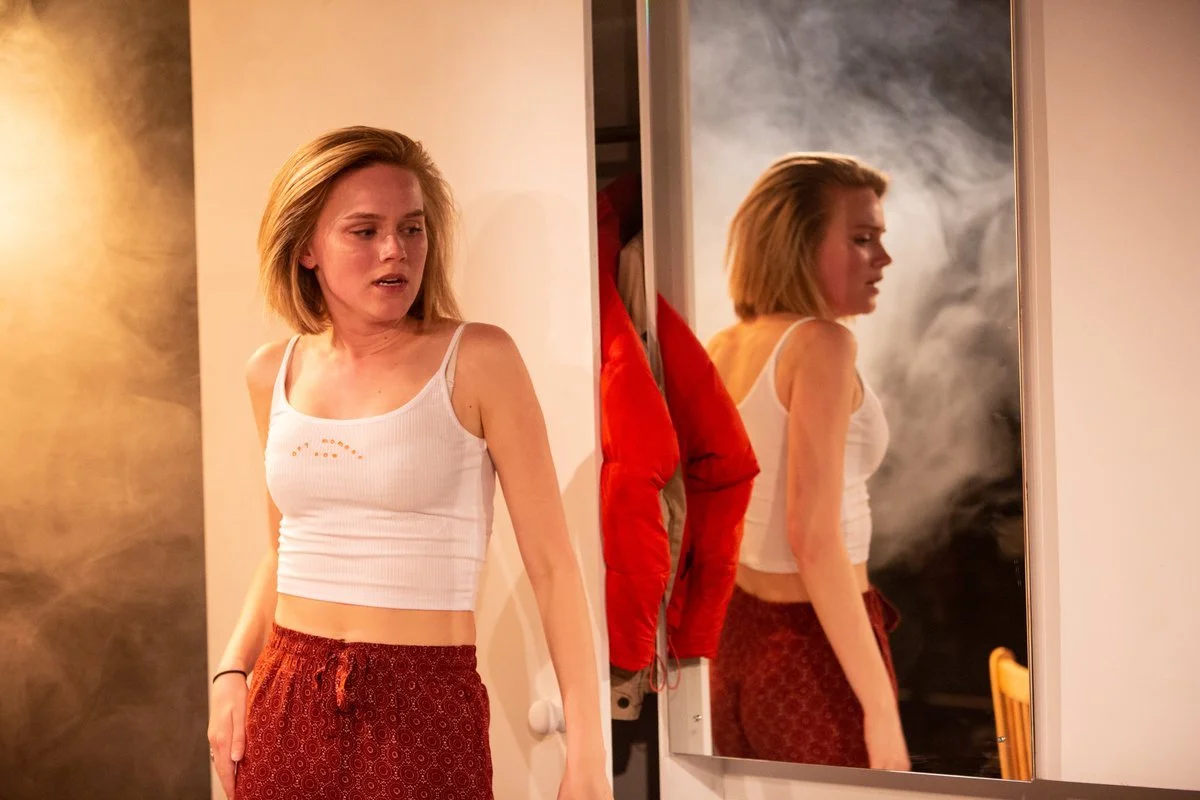Interview: Writer & actor Emma Hemingford on FLINCH!
Photo credit: Ali Wright
Emma Hemingford’s raw and unsettling comedy, Flinch, is currently touring the UK. It is an intense 80-minute show that forces you, the audience, to occupy an uncomfortable space as both jury and accomplice. We spoke to Emma about her closeness to the material and her inspiration behind writing the piece.
You have both written and are starring in Flinch. Does this closeness to the material help or hinder the creative process - or both?
It definitely helps! Because I created Flinch’s central characters, Mark and Jess, I empathise deeply with them both: the way their gender roles limit and define them, the problems they face when trying to communicate authentically… this closeness makes it easy to invest as an actor. However, it's also lovely to get fresh insight into the play from the other creatives involved in the process - often they see something interesting about the text that I didn't notice myself.
This was your writing debut. Based on your experiences of Flinch in its previous incarnation, do you have plans to write more in the future?
I have actually written two more plays since and am in the midst of a middle grade novel! After Flinch, I wrote an adaptation of Eleanor Catton’s debut novel, The Rehearsal, which was workshopped by The Almeida in 2020. I then wrote a play called Foreverland, which was shortlisted for the Papatango Prize this year. Foreverland is set in a near future in which immortality has become possible for the privileged elite. I’m hoping to find the right home for both of these plays soon. My middle grade novel is a Victorian mystery about an orphan who grows up in the attic of a West End theatre. It’s lots of fun.
Where did you draw inspiration from when writing Flinch?
A real story provided me with the jumping off point for Flinch. Someone I knew had a prank played on them: a friend broke into their house pretending to be a robber. The incident played out in a surprising – and awkward – way, and I remember thinking I’d have loved to be a fly on the wall for the moments after. In terms of literary inspiration, I was reading a lot of brilliant two-handers when I started writing Flinch: Macmillan’s Lungs, Payne’s Constellations and Bartlett’s An Intervention. I knew I wanted to try to write something similar – a play with fizzy energy that demanded to be spoken. I was also a fair bit younger when I wrote Flinch, and life felt a lot more frightening – a lot of that angst found its way into both characters!
How was the rehearsal process?
Rehearsals were really intense! We only had two weeks to get the show on its feet, so there was a lot of hysterical laughter and coffee. It was a great process though.
Has Flinch further developed since its run at the Old Red Lion?
It’s developed a lot. We have an entirely new creative team, including a new director, Gemma Aked-Priestley. She’s extremely talented: she's really helped to create a vivid interior world for both characters, and has found a lovely authenticity for the piece.
Tell us about your character, Jess.
Jess is a complicated character: she can be fiery, she can be evasive; she desperately wants to be understood but also struggles to express herself. I don’t think she likes herself very much, so her central conflict is between wanting to be seen and worried about what people will find if they look. During the play, she goes on a journey and battles some of these demons. I hope she’s likeable despite her flaws – she’s often funny, she’s certainly relatable, and she’s trying her best.
How is it working with Benjamin Aluwihare who is playing Mark?
Fantastic! Benjy is a really talented and curious actor, always asking questions and trying to get to the heart of things. He’s also a playful and kind person which makes him a great performer and a great human too.
Do you think audiences will be able to relate to your characters?
I really think so. The main feedback we got from audience members when we originally put on Flinch at the Old Red Lion was how much the play reminded them of conflicts they’d had in their own relationships. Someone even asked me if I had put cameras in their bedroom! I think it’s more interesting to write a play about gender roles in which we can see ourselves, rather than a play which presents us with terrible characters we can emotionally distance ourselves from. Flinch should feel cringe-inducingly close to home…
It is quite an intense piece. How do you sustain this for the full 80-minute duration?
I actually think it helps as an actor to be on stage throughout the show – you can jump in and immerse yourself in the world of the play until the end. It is an intense piece though, so I do feel pretty drained afterwards.
Are you looking forward to taking Flinch on tour around the country?
We’re on tour now and I’m enjoying it so much. After a year of lockdown, it feels extra special to be both travelling around the UK and to be performing. It’s really exciting to share the play with new audiences and hear fresh opinions on its themes. I don’t want to go home!
Flinch continues to tour and concludes its run at The Pleasance from 23-25 November, with tickets available here.

